 Visit Elective Africa website Visit Elective Africa website
|


|
|
|
| 11 Answers to 11 Questions on undertaking a Healthcare Placement Abroad |
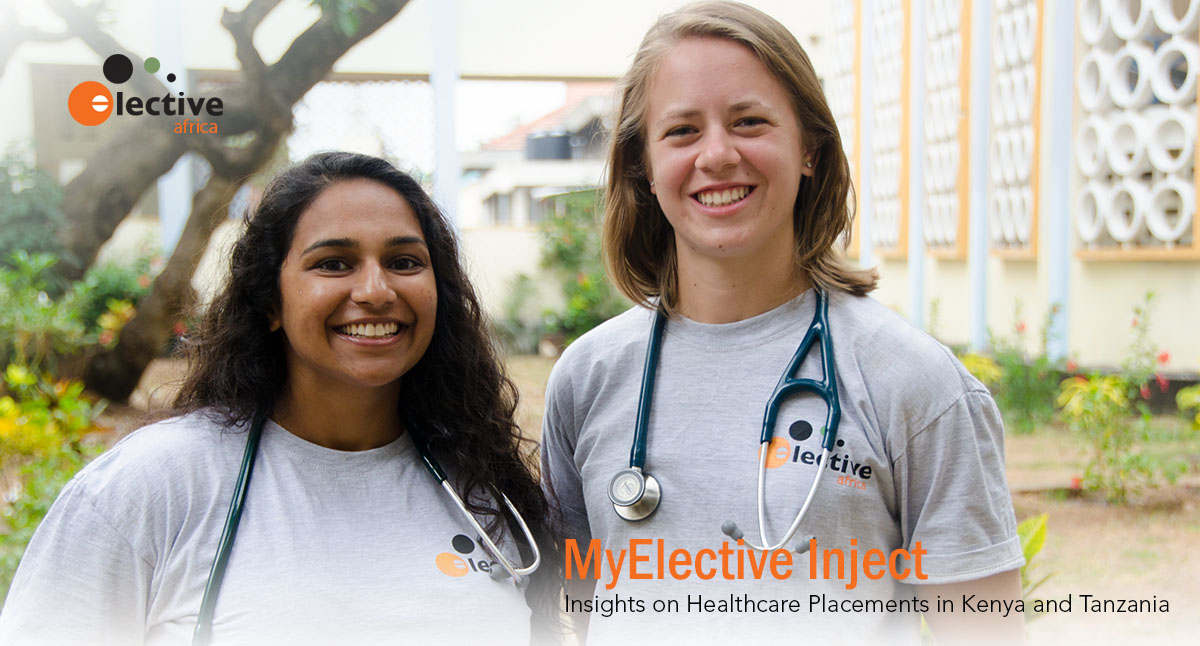 |
|
It's that time of the month for MyElective Inject. Here's what not to miss! Arusha is and still remains to be one of the most attractive destinations in Africa. Apart from its proximity to the world's most adored national parks and second highest mountain, it's also one of our popular program destination. Find out why. Speaking about destination, we also take time to answer 11 of your most frequently asked questions including one on safety. And even as the world commemorates World Health Mental Day, see opportunities available for students in psychiatry training with interest in undertaking an elective abroad. Are you a good writer with an interesting healthcare topic you are passionate about? Would your like your story to reach over 3000 healthcare students? Reach out to us and let your story be part of our next edition. Back to top |
| An Incredible Learning Experience |
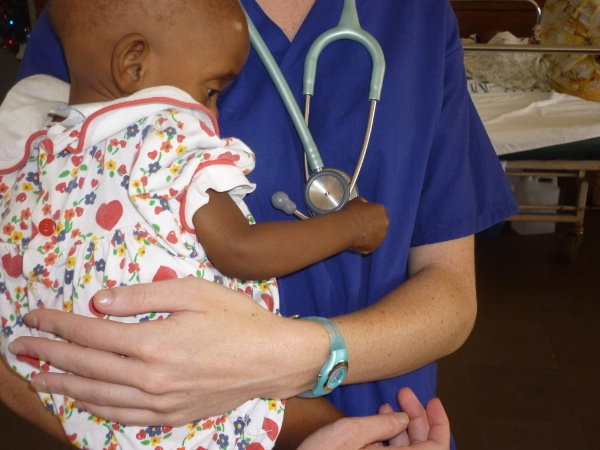 |
|
My four weeks at Mt.Meru Regional Hospital OBS&GYN Department have been an incredible learning experience.The doctors and staff have been welcoming and willing to teach.The department is extremely busy and there lots of opportunities for hands on including deliveries. Elyssa Metas is from University of Arizona. Read more stories at www.electiveafrica.com/testimonials Back to top |
| Yaay! Let's Travel Together |
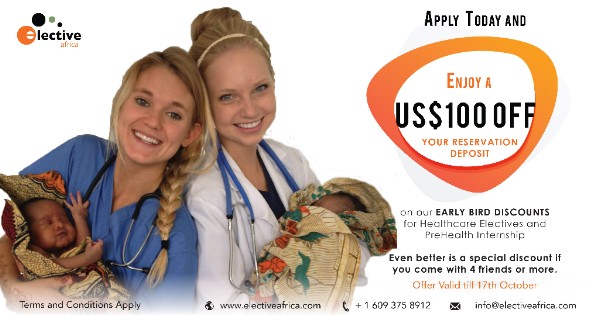 |
|
Submit your application at www.electiveafrica.com/apply/ |
| 6 Undeniable reasons people love Arusha,Tanzania |
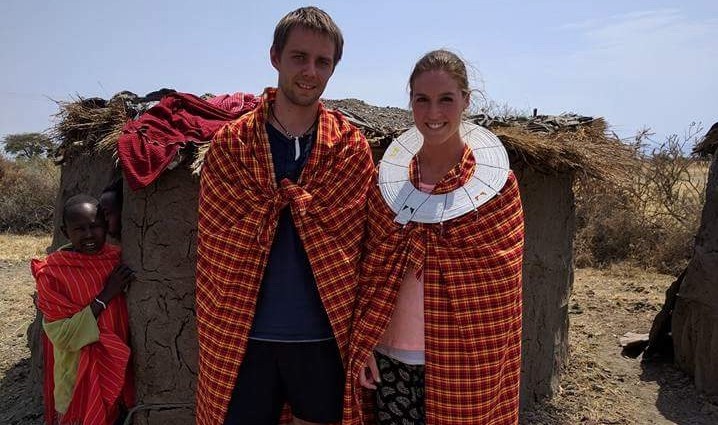 |
|
The Local Excursions Talk of very unique areas to visit during the day and experience great serenities. Arusha is endowed with many of such unique sites. Whether you want to swim in naturally flowing water at Chemka springs or you want to ride in the boat at Duluti waterfalls or a visits to the snake parks and other cultural centers , Arusha never disappoints. The local excursions makes it not only fun and adventure to be there but also lovable as your next travel destination. Proximity to National Parks and Game reserves i.e Safaris Anyone contemplating a visit to Africa has a common knowledge of the amazing Safari sites to visit. Arusha is one such location centrally located for one to undertake the Safari. The Mount Meru National Park is slightly less than an hour away from the town center of Arusha. Other parks very close to the location include Ngorongoro crater, Lake Manyara Tarangire and Serengeti. A visit to the parks is very enriching and adds up to the attractiveness of Arusha as a lovable travel site. The Kilimanjaro Trek Arusha town is the closest city to the highest free standing mountain in the world MT Kilimanjaro. For travellers with interest in mountain climbing and hiking prefer to prepare for their climb while in Arusha due to its closeness to the foot of the mountain. Going up Kili is a fun, adventure & explorative activity that you don’t want to miss especially if you are a fan of hiking. The Vibrancy of Culture Arusha is known for its blend of various communities in a very distinct culture which is both educative to be part of and fun to learn about. The famous Maasai culture is profoundly present in this city and a visit to Maasai villages and a purchase of souvenirs from the locals is mind blowing and a great way to relax from the day's work . Arusha people are predominantly Swahili speaking and the Swahili culture blended with the well prepared Swahili dishes identifies this location as a go to place for culture integration and immersion. The friendliness of the People Arusha is also popularly known for the very friendly people present. The city is referred as a city by the locals. On the streets you will expect to hear “Jambo” which means How are you or even “Mzungu” which means white or even “rafiki” which means friend. Safe and Classy Accommodation options The city is further loved by travelers due to the variety of options available for accommodation. Whether you are travelling as a family on holiday and want a high profile hotel or you are a gaper seeking to adventure and hence looking for a budget accommodation you have your interest catered for and with variety of options depending on your budget and specifications. If travelling for an elective or a short volunteer project, there is also vast opportunities in furnished apartments for short term lease. Are you seeking to travel to Arusha on holiday, for a volunteer project or even to experience the nature and attractiveness of the location, Elective Africa is your partner. Reach out to us and let’s get started on this. Find your destination at www.electiveafrica.com/destinations Back to top |
| 11 Answers to 11 Questions about our Healthcare Electives Abroad Programs |
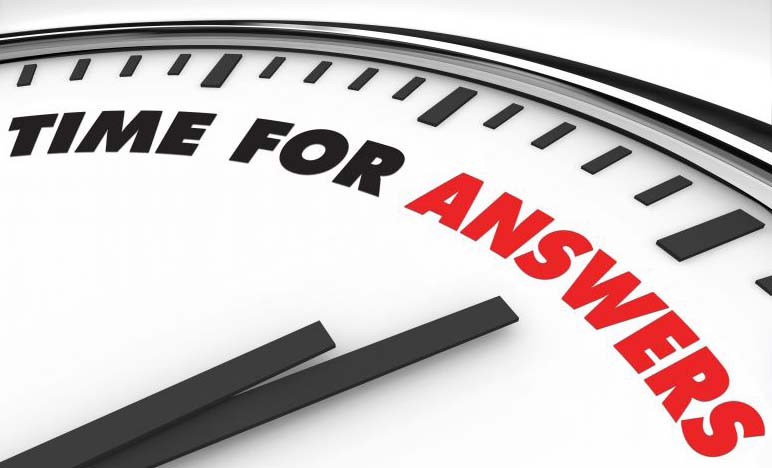 |
|
1. What Medical Advice do I Need? Students should get the latest medical advice on inoculations and malaria prevention before coming to Kenya from their physician. Malaria risk exists all year round. Immunization against yellow fever, polio and typhoid are usually recommended, but please consult your physician prior to travel.
2. Is it safe to volunteer in Kenya? One of the key reasons for using Elective Africa to facilitate and organize your elective or volunteering in Africa is that we will do everything we can to ensure you are safe during your time abroad. Kenya is one of the safest countries in Africa. We ensure you are placed in safe environment and you will be very well looked after while volunteering in Kenya. The Kenyan people are very warm and friendly towards visitors.
3. Do you cater for groups or other specialist volunteers such as professionals? Yes we do. All of our programs are suitable for any type of volunteer and even those who are traveling as a group. However we also tailor programs for groups and individuals seeking to volunteer in specialized programs that may not be part of our standard projects. So whether you are a group, a researcher or a student seeking to volunteer in a specific area, we will design a program for you. For these volunteers, we ask you to contact us so that we may get in touch with you and begin working with you to develop a program that will meet your specific requirements.
4. Can I do more than one placement? Yes you can. This is an enriching experience for students undertaking a Gap Year Volunteer or and Medical Electives and Internship Program. Working in multiple locations can give you a chance to experience different aspects of your program such as an urban elective and rural elective experience or two different countries electives such as Kenya and Tanzania and thus enhance your overall volunteer experience.
5. What happens when we first arrive? This depends on your arrival airport. If you arrive in Mombasa’s Moi International Airport, we meet you at the airport and take you directly to our safe student housing. However, flying to Mombasa can be expensive compared to flying to Nairobi, so some of our participants choose to fly to Nairobi and then take a 6 to 7 hour bus ride to Mombasa. If you fly to Nairobi, we pick you up at the Jomo Kenyatta International airport and drive you Park Side Hotel in the city centre or any other hotel of your choice where you stay and relax overnight. You depart the following day for your project. Students are required to send flight details prior to their traveling dates. Please note that if you arrive in Nairobi, you will be paying the cost of overnight stay at a hotel in the city and the cost of bus ride down to Mombasa. We cover the cost of airport pick and transfer for both Nairobi and Mombasa airports.
6. Where will I stay? Our participants live in student housing, by default, but upon request we do arrange a Kenyan host family. For student housing, you get to spend time with like minded people, and you have a house that you can call home for your duration in the program. You have a place that has the peer environment to unwind and get to spend time with colleagues. For those who prefer host family, we believe that goes a long way in giving volunteers greater insight into the lives and culture of the Kenyan people thus enriching the volunteer experience. We make efforts whenever possible to accommodate specific requests that a volunteer may have with regards to their preferred accommodation.
7. Do I have to speak Swahili? No you do not. You will get a long extremely well with just English. However, it is helpful to learn some basic words and phrases of Swahili and this is covered during our training and orientation program.
8. How can I communicate with home from abroad? When you arrive we can show you where to get local Sim cards for your mobile phones. Its cheap to text Europe and America using these. Additionally our program residence has internet connectivity therefore you can always Tweet, Facebook, Email or Snapchat your friends back home and share the memorable moments.
9. How do I get a Visa? Visa can be obtained on arrival at the Airport. Pretty much all foreigners require a passport and a visa to enter the country. Its easy to get a Visa to Kenya or Tanzania on arrival at the airport. Participants can also obtain their visas before they depart from their country. For Kenya : Ordinary or a single journey entry visa costs $50. Multiple journey visas costs $110 for all nationalities. Tanzania: US Citizens Single and all multiple entry visas cost $100. Non-US Citizens visa fees is $50 for single entry and US$ 100 for double entry.
10. What other safety issues should I be aware of? The locals are very friendly and will always meet you with friendliness and greet you "MZUNGU". Your security is priority and you should quickly reach out to your local contact person in case you feel endangered. Be sure to take some precautions such as:
11. What do I need to pack? Volunteers need to bring their own towels, toiletries and other personal effects. Please note that volunteers are responsible for their own laundry. It is safe to bring your hair dryers, shavers and other electrical products. Other suggested items:
Elective Africa Help desk is always available 24 hours a day and we are happy to respond to any questions you may have on travelling and volunteer abroad www.electiveafrica.com/contact Back to top |
| Mental Health; Scaling the Heights of Global disease Burden |
 |
|
According to the world health organization, one in four people in the world will be affected by mental or neurological disorders at some point in their lives. Around 450 million people currently suffer from such conditions, placing mental disorders among the leading causes of ill-health and disability worldwide. Further in its research conducted in 2015, WHO attests that in most cases 45% of the mental health illnesses go untreated.
The above statistics is a clear indicator of the accrued need for more healthcare professionals to address the rising demand and global burden of disease in mental health.
Health systems across the developing countries are faced by a great challenge in dissolving and curbing the spread of mental health and related illnesses. This has been especially prompted by the very minimal resources in finances and the inadequate staff to address the disease which accounts to around 14% of the global burden of disease. The developing countries are commonly known for the communicable diseases which are therefore given a priority by the public health personnel. Issues on mental health are therefore often overlooked and hence leading to the unprecedented rise in the mental health and related disabilities.
With the rise of mental health in the morbidity charts, there is great need to focus energy and invest in various interventions which could be used to bridge the mental health gap. Among this are:
For students in psychiatry training, undertaking an Elective Abroad is an enriching experience. One gets an opportunity to grow their skills and experiences through participation. One is also able to:
Here is a past student highlight on participation in this program: "I was able to meet the only public psychiatrist in Mombasa region and arrange further meetings. This allowed me to see the medical side of treating the patients and we had many interesting discussions about the difference between psychiatry in the United Kingdom and Kenya. He worked in a large number of roles ranging from forensic psychiatry, running a methadone clinic and seeing general psychiatry inpatients. I have been interested in forensic psychiatry for a long time and I spent 2 days with the psychiatrist while he decided whether suspected criminals were fit to stand trial. It amazed me how quickly this could be done. It also allowed me to see some fascinating cases; including terror and murder suspects ...."Read More on Sophie Turner experience at The Psychiatry Elective Experience in Kenya Back to top |
| Did you Miss this Webinar? |
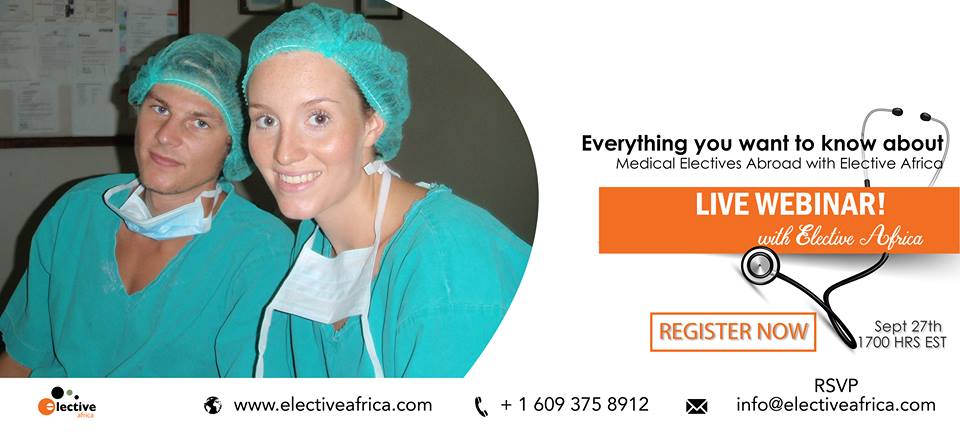 |
|
You can now get our webinar on Everything you want to know about Medical Electives Abroad with Elective Africa Recording Here Here are some items touched on;
|
| Interested in coming for a Healthcare Internship Abroad? |
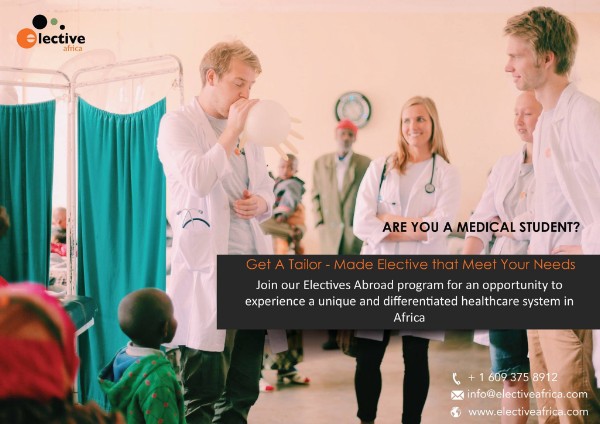 |
|
Back to top |
|
|

 10 2017
10 2017